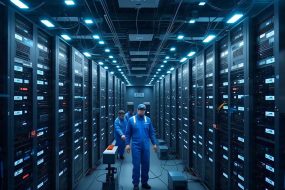
The Desperate Gamble of Tech Giants: Harnessing AI for Nuclear Power
In a bid to revolutionize the nuclear power industry, tech giants are making a desperate gamble by harnessing the power of artificial intelligence (AI). The nuclear power sector, once considered a stalwart of traditional energy production, is now facing unprecedented challenges, including rising costs, declining public trust, and increasing competition from renewable energy sources. In this article, we’ll delve into the world of nuclear power and explore how AI is being used to transform this industry.
The Challenges Facing Nuclear Power
The nuclear power industry is facing numerous challenges, including:
- Rising Costs: The cost of building and maintaining nuclear power plants is increasing, making it less competitive with other forms of energy production.
- Declining Public Trust: The Fukushima Daiichi nuclear disaster in 2011 and other high-profile accidents have eroded public trust in the nuclear power industry.
- Increasing Competition: Renewable energy sources, such as solar and wind power, are becoming increasingly cost-competitive with nuclear power.
The Role of AI in Nuclear Power
AI is being used to transform the nuclear power industry in several ways, including:
- Predictive Maintenance: AI-powered predictive maintenance can help identify potential equipment failures before they occur, reducing downtime and increasing overall efficiency.
- Real-time Monitoring: AI-powered real-time monitoring can help detect anomalies in the nuclear power plant’s operation, enabling swift action to be taken to prevent accidents.
- Optimization of Operations: AI can optimize the operation of nuclear power plants, reducing energy consumption and increasing overall efficiency.
Use Cases of AI in Nuclear Power
Several tech giants, including Google, Microsoft, and IBM, are working with nuclear power companies to develop AI-powered solutions. Some examples of use cases include:
- Google’s Partnership with Exelon: Google is working with Exelon, a leading nuclear power company, to develop an AI-powered predictive maintenance system.
- Microsoft’s Partnership with Westinghouse: Microsoft is working with Westinghouse, a leading nuclear power company, to develop an AI-powered real-time monitoring system.
- IBM’s Partnership with Areva: IBM is working with Areva, a leading nuclear power company, to develop an AI-powered optimization system.
Comparison with Other Energy Sources
AI-powered nuclear power plants have several advantages over other energy sources, including:
- Reliability: Nuclear power plants are highly reliable and can operate continuously, making them an attractive option for baseload power generation.
- Scalability: Nuclear power plants can be scaled up or down depending on energy demand, making them a flexible option for energy generation.
- Low Greenhouse Gas Emissions: Nuclear power plants produce very low greenhouse gas emissions, making them an attractive option for countries seeking to reduce their carbon footprint.
Features of AI-Powered Nuclear Power Plants
AI-powered nuclear power plants have several features, including:
- Advanced Sensors: AI-powered nuclear power plants are equipped with advanced sensors that can detect anomalies in the plant’s operation.
- Real-time Data Analytics: AI-powered nuclear power plants use real-time data analytics to optimize the plant’s operation and detect potential equipment failures.
- Predictive Maintenance: AI-powered nuclear power plants use predictive maintenance to identify potential equipment failures before they occur.
Conclusion
The nuclear power industry is facing unprecedented challenges, but the use of AI is transforming this industry in several ways. Tech giants, including Google, Microsoft, and IBM, are working with nuclear power companies to develop AI-powered solutions that can optimize the operation of nuclear power plants, reduce energy consumption, and increase overall efficiency. As the use of AI in nuclear power continues to grow, we can expect to see more innovative applications of this technology in the future.













